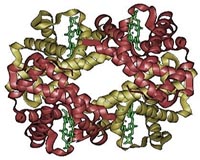 |
Parma, Italy (UPI) Oct 12, 2009 Italian scientists say they've discovered mother macaques and their newborn infants have early interactions that are similar to those of humans. "What does a mother or father do when looking at their own baby?" asked researcher Pier Francesco Ferrari of Italy's University of Parma. "They smile at them and exaggerate their gestures, modify their voice pitch -- the so-called 'motherese' -- and kiss them. What we found in mother macaques is very similar: They exaggerate their gestures, 'kiss' their baby and have sustained mutual gaze." Ferrari also noted in humans, the communicative interactions go both ways. Newborns are sensitive to their mother's expressions, movements and voice, and they also mutually engage their mothers and are capable of emotional exchange. "For years, these capacities were considered to be basically unique to humans," the researchers said, "although perhaps shared to some extent with chimpanzees." They said their findings extend those social skills to macaques, suggesting the infant monkeys may "have a rich internal world" that we are only now beginning to see. "Our results demonstrate that humans are not unique in showing emotional communication between mother and infant," the researchers wrote. "Instead, we can trace the evolutionary foundation of those behaviors, which are considered crucial for the establishment of social exchange with others, to macaques." The study appears in the online early edition of the journal Current Biology. Share This Article With Planet Earth
Related Links Hospital and Medical News at InternDaily.com
 Gene affecting hemoglobin is identified
Gene affecting hemoglobin is identifiedLondon (UPI) Oct 12, 2009 British scientists say they've identified a gene that has a significant effect on regulating hemoglobin in the body. The achievement came during a genome-wide association study conducted by Imperial College London researchers who looked at the link between genes and hemoglobin level in 16,000 people. It shows a strong association between a gene known as TMPRSS6 and the regulation of ... read more |
|
| The content herein, unless otherwise known to be public domain, are Copyright 1995-2009 - SpaceDaily. AFP and UPI Wire Stories are copyright Agence France-Presse and United Press International. ESA Portal Reports are copyright European Space Agency. All NASA sourced material is public domain. Additional copyrights may apply in whole or part to other bona fide parties. Advertising does not imply endorsement,agreement or approval of any opinions, statements or information provided by SpaceDaily on any Web page published or hosted by SpaceDaily. Privacy Statement |